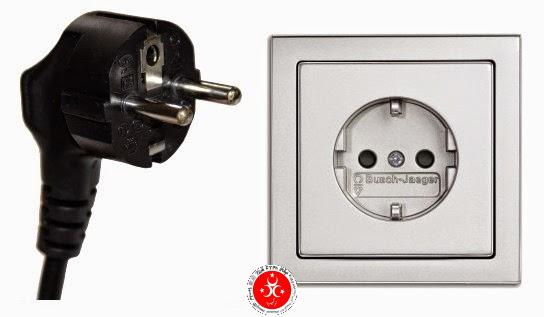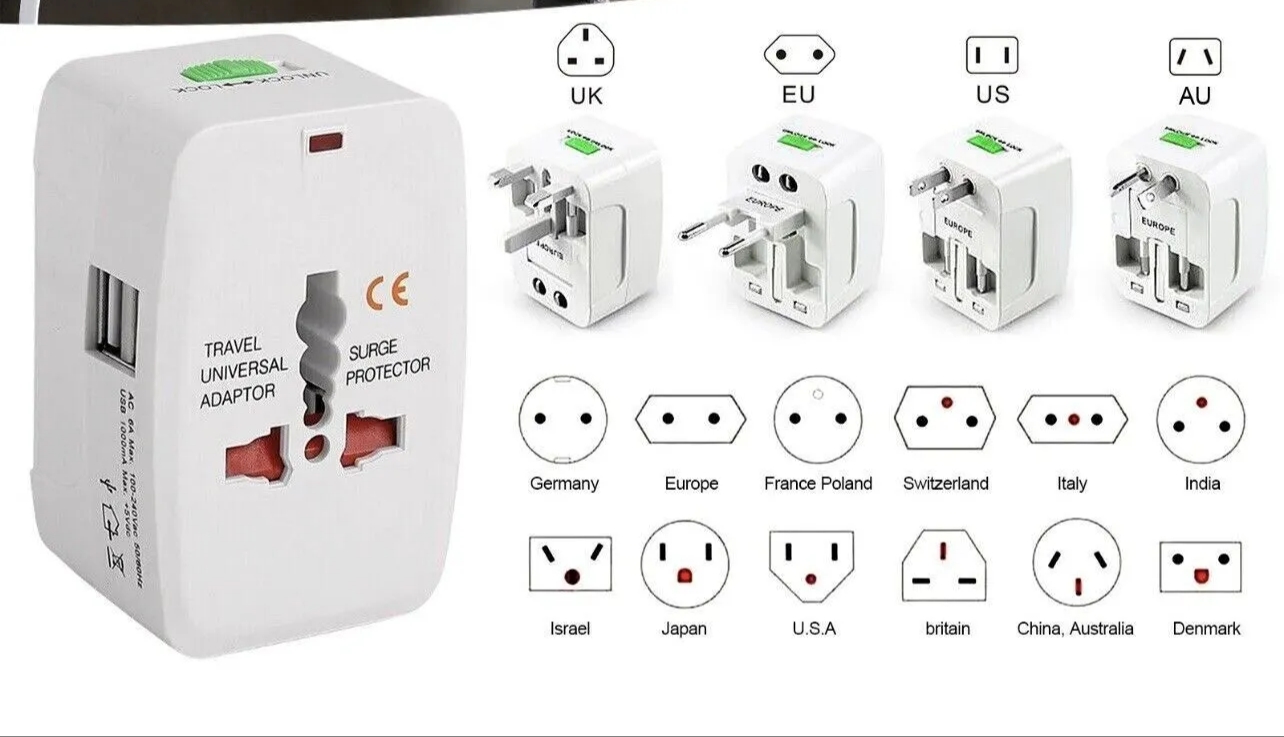Table of Contents
Learn everything you need to know about Turkey’s plug type, including which devices are compatible, safety tips, and frequently asked questions, in this easy-to-understand guide.
Electricity is a key part of our daily lives, and it’s crucial to stay connected when you’re traveling. If you’re planning a trip to the wonderful country of Turkey or just want to learn more about different types of plugs used around the world, this article will help you understand the Turkish plug type better. So buckle up, and let’s explore this important topic together!

Which type plugs is used in Turkey?
In Turkey, the electrical outlets and plugs use a specific type called Type F, also known as the Schuko plug (derived from the German word Schutzkontakt, which means “protective contact”).
The plug also features two grounding clips on the sides. Type F is common in many European countries, making it convenient for European travelers to adapt their devices in Turkey.
- Turkey plug type specifications:
- Shape: Circular
- Pins: Two round pins
- Pin Diameter: 4.8 mm each
- Pin Length: 19 mm
- Pin Spacing: 19 mm apart
- Grounding: Two grounding clips on the sides
- Electrical Specifications for Turkey:
- Voltage: 230 Volts
- Frequency: 50 Hertz
Voltage and Frequency in Turkey; Is Your Device Compatible?
Before plugging in your gadgets, it’s essential to check whether they’re compatible with the Turkey plug type. Most modern devices can handle a range of voltages, but it’s always wise to double-check the label or the manual to avoid any mishaps.
- Key points to consider:
- Voltage range: Ensure your device can handle 220-240 volts
- Frequency: Check if your device is compatible with 50 Hz
- Plug type: Make sure your device’s plug is compatible with Type F sockets

When Plugs and Sockets Collide: Adapters and Converters
A Quick Overview On Adapters
Travelers from countries with different plug types, such as the United States or the United Kingdom, will definitely need an adapter to use their devices in Turkey. The US uses Type A and Type B plugs, while the UK uses Type G plugs; both are incompatible with Turkey’s Type F sockets.
You can get a region-specific adapter that is designed for a specific plug type or to avoid any inconvenience, it’s a good idea to buy a universal travel adapter before you go. These adapters are widely available online and in electronics stores, and they often come with multiple plug options to suit various countries’ standards. Additionally, some universal adapters include USB ports, which can be useful for charging multiple devices like phones and tablets at once.

Converter Conundrum
Travelers from countries with different voltage standards, like the United States where the voltage is 110V, will need a voltage converter to use their devices in Turkey. Turkey operates on a 230V supply voltage, which is significantly higher than the US standard. Using devices without a converter could result in damage to your electronics or even pose a safety hazard. Voltage converters are designed to step down the high voltage to a level your devices can handle. These devices are readily available online and in electronics stores. It’s crucial to check the wattage of your devices to ensure the converter you purchase can handle the power requirements. Many modern electronics, like phone chargers and laptops, are dual voltage (110-240V) and only require a plug adapter, so make sure to confirm your device specifications before buying a converter.
- Types of converters:
- Step-down converters: Convert 220-240 volts to 110-120 volts
- Step-up converters: Convert 110-120 volts to 220-240 volts
Safety First: Tips and Tricks
- Check Device Voltage: Always verify that your device is compatible with the 230V voltage used in Turkey. Look for markings on the device or its power adapter indicating “Input: 100-240V.”
- Use Appropriate Adapters: Ensure you are using the correct Type F adapter for plug types that differ from Turkey’s standard.
- Inspect Adapters and Converters: Before using them, check for any visible damage to avoid short circuits or electrical shocks.
- Avoid Overloading Sockets: Do not plug too many high-wattage devices into a single outlet, which can cause overheating or fire hazards.
- Use Quality Converters: Invest in a reliable voltage converter if your device is not dual voltage. Avoid cheap, low-quality converters that could fail or overheat.
- Check Wattage Limits: Make sure that the adapter or converter can handle the wattage of the devices you plan to use, especially for high-power appliances like hair dryers or electric kettles.
- Turn Devices Off When Not in Use: Unplug devices when they are not in use to prevent overheating and conserve energy.
- Read Manufacturer Instructions: Always follow the instructions provided by the manufacturer for both your devices and the adapters/converters.
- Keep Dry: Avoid using electrical devices near water or in wet conditions to prevent electric shocks.
- Report Issues: If you notice any unusual behavior like sparks, burning smells, or overheating, turn off the device immediately and unplug it.
Where to Buy Adapters
Airports:
Many international airports in Turkey, such as Istanbul Airport (IST) and Sabiha Gökçen International Airport (SAW), have travel stores and electronic shops where you can purchase adapters and converters.
Electronic Stores:
- Teknosa: A popular electronics retailer with locations throughout Turkey. You can find a range of adapters and converters here.
- Media Markt: Another major electronics chain with multiple branches across the country, offering a wide selection of travel adapters and converters.
- Vatan Bilgisayar: Known for their extensive electronics and accessory options, this store is also a good choice for finding travel essentials.
Department Stores:
- Koçtaş: A popular home improvement and electronics store where you may also find travel adapters and converters.
Convenience Stores:
Many convenience stores and supermarkets in major Turkish cities stock basic travel adapters.
Hotels:
Some hotels may offer adapters for guest use or have them available for purchase at their gift shops.
Online Retailers:
If you have internet access, consider purchasing adapters and converters from online retailers like Amazon Turkey or Hepsiburada, which offer delivery services to your location in Turkey.
Frequently Asked Questions
1.What type of electrical plugs are used in Turkey?
Turkey uses the Type F plug, also known as the Schuko plug. This plug has two round pins and grounding clips on the sides. It’s standard across many European countries.
2. What is the voltage and frequency in Turkey?
Turkey operates on a 230V supply voltage and 50Hz frequency. This is consistent with much of Europe but differs from countries like the United States and Japan, which use 110V.
3. Do I need an adapter when traveling to Turkey?
If you are coming from a country that does not use Type F plugs (e.g., the US, UK, Australia), you will need a plug adapter to connect your devices to Turkish outlets.
4. Will I need a voltage converter for my devices in Turkey?
You will need a voltage converter if your devices are not dual voltage (110-240V). Check your device’s label or manual to see if it can handle the 230V power standard in Turkey. Many modern electronics like smartphones and laptops are dual voltage and only require a plug adapter.
5. Where can I buy an adapter or voltage converter in Turkey?
You can purchase adapters and converters at airports, electronic stores like Teknosa, Media Markt, and Vatan Bilgisayar, department stores like Koçtaş, convenience stores, some hotels, and online through retailers like Amazon Turkey and Hepsiburada.
6. Can I use high-wattage devices in Turkey?
Yes, but make sure your adapter and converter can handle the device’s wattage. Devices like hair dryers and electric kettles require more power, so check their specifications and ensure your adapter/converter supports them.
7. What should I do if my device doesn’t work in Turkey?
First, check if the device is compatible with the 230V voltage. Ensure you are using the correct adapter and, if needed, a converter. If the problem persists, avoid using the device and seek help at a local electronics store or from your hotel.
8. Are there USB ports available in Turkish outlets?
Generally, standard outlets in Turkey do not have built-in USB ports. However, many universal travel adapters come with USB ports, allowing you to charge multiple devices simultaneously.
- 9. Can I buy a universal adapter that works in Turkey and other countries?
Yes, universal adapters are a convenient option as they include multiple plug types, including Type F, and can be used in various countries around the world. Look for ones with added features like USB ports and surge protection.
10. Is it safe to use my electronics in Turkey?
It is safe to use your electronics in Turkey if you follow the necessary precautions, such as using the correct plug adapter, checking voltage compatibility, and ensuring your devices are in good working condition. Always follow manufacturer instructions and avoid overloading power outlets.






